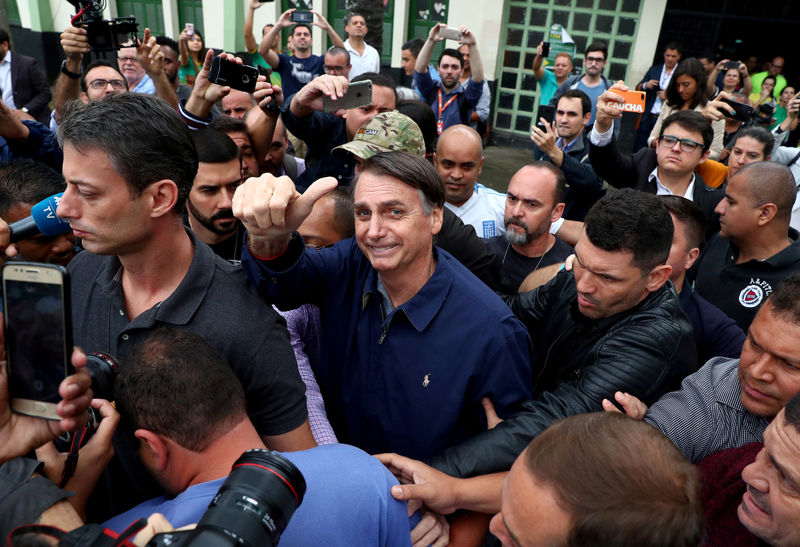By Bruno Federowski and Paula Laier
BRASILIA/SAO PAULO (Reuters) - Brazilian markets rose on Monday after far-right presidential candidate Jair Bolsonaro ran up a huge lead in the first round of voting, boosting investors' hopes that he will tackle a growing fiscal deficit and privatize key companies.
The benchmark Bovespa stock index (BVSP) rose 3.6 percent to 85,307, led by state-controlled oil company Petróleo Brasileiro SA (SA:PETR4), which contributed over 500 points of the Bovespa's 2,985-point gain.
State utility Centrais Elétricas Brasileiras SA (SA:ELET6), which Bolsonaro has said he would privatize, soared 12 percent.
Brazil's currency, the real (BRBY), gained 2 percent to 3.78 to the dollar, the strongest since August, while yields on interest rate futures <0#DIJ:> fell sharply.
Bolsonaro, an outspoken apologist for Brazil's 1964-1985 military dictatorship, came up short of a majority needed to avoid the runoff. He will face leftist Fernando Haddad, the former mayor of São Paulo, in a second round of voting on Oct. 28.
Brazilian markets had already rallied in recent weeks as polls showed a consistent lead for Bolsonaro, a longtime statist who made a late conversion to orthodox economic policies after tapping a University of Chicago-trained banker as his main economic adviser.
Bolsonaro, who has served for decades as a lower house lawmaker, has pledged to crack down on crime and corruption, seizing on voter anger with the establishment after a series of graft scandals he blamed on Haddad's Workers Party.
His strong showing in the polls outperformed even the most favorable major surveys and he managed to turn his once-tiny party into a powerhouse in Congress, suggesting he may have an easier-than-expected time passing reforms.
"If you take away the votes of every leftist lower house member, you'd still have enough votes to pass the necessary reforms," said David Souccar, who helps to manage $20 billion worth of emerging-market assets for Vontobel Quality Growth. "Even if Haddad wins, it is clear that he would have to take steps towards the center to do so."
Vontobel holds roughly 10 percent of its emerging-market portfolio in Brazil, compared to a 6 percent exposure for MSCI's emerging-market index (MSCIEF). It has focused on companies that would benefit from a consumption-driven recovery under a scenario of gradual fiscal reform -- such as beverages firm Ambev SA (SA:ABEV3) and Itaú Unibanco Holding SA (SA:ITUB4), the nation's largest private bank.
Itaú Unibanco and rival Banco Bradesco SA (SA:BBDC4) were, along with Petrobras, among the biggest point contributors to the Bovespa's gain.
Souccar's bullish sentiments were widely shared. Strategists at Banco BTG Pactual SA said the benchmark Bovespa stock index (BVSP) has been trading at multiples below its historical average and could now jump to around 90,000.
If Bolsonaro wins a runoff election, they "wouldn't be surprised" if the index reached 105,000, with stocks of state-controlled companies, consumption and real estate among the largest winners.
Santander (MC:SAN) Brasil strategists upgraded their recommendation on Brazilian stocks to "overweight" in its Latin American portfolio and forecast the index would reach 105,000 by year-end.

Sixty of 65 stocks included in the index rose on Monday, with many posting double-digit gains. Losses concentrated on export-driven firms such as wood pulp producer Suzano Papel e Celulose SA (SA:SUZB3), which would suffer from a stronger currency.